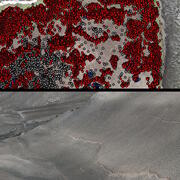Machine learning (ML)
Center of Excellence for Geospatial Information Science (CEGIS)
Machine learning (ML) is a type of technology that uses algorithms to find patterns and make predictions based on examples, like recommending movies based on past preferences.
CEGIS uses machine learning to map terrain features and analyze landscapes, which helps with planning and managing the environment.





